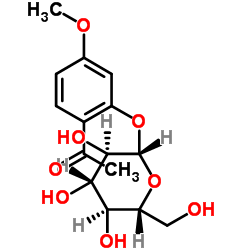20309-70-0
| Name | paeonoside (C15 glycoside) |
|---|---|
| Synonyms |
2-Acetyl-5-methoxyphenyl beta-D-Glucopyranoside
(2-Acetyl-5-methoxy-phenyl)-β-D-glucopyranosid 2-Acetyl-5-methoxyphenyl β-D-glucopyranoside paeonoside (2-acetyl-5-methoxy-phenyl)-β-D-glucopyranoside glucopaeonol Resacetophenon-4-O-methyl-2-β-D-glucosid |
| Description | Paeonoside is a bioactive compound identified in P. suffruticosa that promotes wound healing and migration in osteoblast differentiation. Paeonoside has also been reported to have some antidiabetic activity and may prevent sepsis-induced lethality[1]. |
|---|---|
| Related Catalog | |
| In Vitro | Paeonoside (PASI) (0.1-100 μM, 24 h) has no cytotoxic effect on pro-osteoblasts of MC3T3-E1 cells[1]. Paeonoside (PASI) (1-30 μM, 24 h) can significantly restore wound areas and promote cell migration in a dose-dependent manner during the induction of preosteoblast of MC3T3-E1 cells differentiation using osteogenic supplement (OS) medium. In parallel, PASI promotes alkaline phosphatase (ALP) staining and its activity in a dose-dependent manner[1]. Western Blot Analysis[1] Cell Line: Pro-osteoblasts of MC3T3-E1 cells Concentration: 1-10 μM Incubation Time: 24 h Result: Increased the expression of BMP2 and Wnt3a, stimulated Smad1/5/8 phosphorylation, GSK3β phosphorylation and β-linked protein expression as well as upregulated RUNX2 expression. |
| Density | 1.4±0.1 g/cm3 |
|---|---|
| Boiling Point | 589.9±50.0 °C at 760 mmHg |
| Molecular Formula | C15H20O8 |
| Molecular Weight | 328.315 |
| Flash Point | 219.2±23.6 °C |
| Exact Mass | 328.115814 |
| PSA | 125.68000 |
| LogP | -1.10 |
| Vapour Pressure | 0.0±1.7 mmHg at 25°C |
| Index of Refraction | 1.593 |
